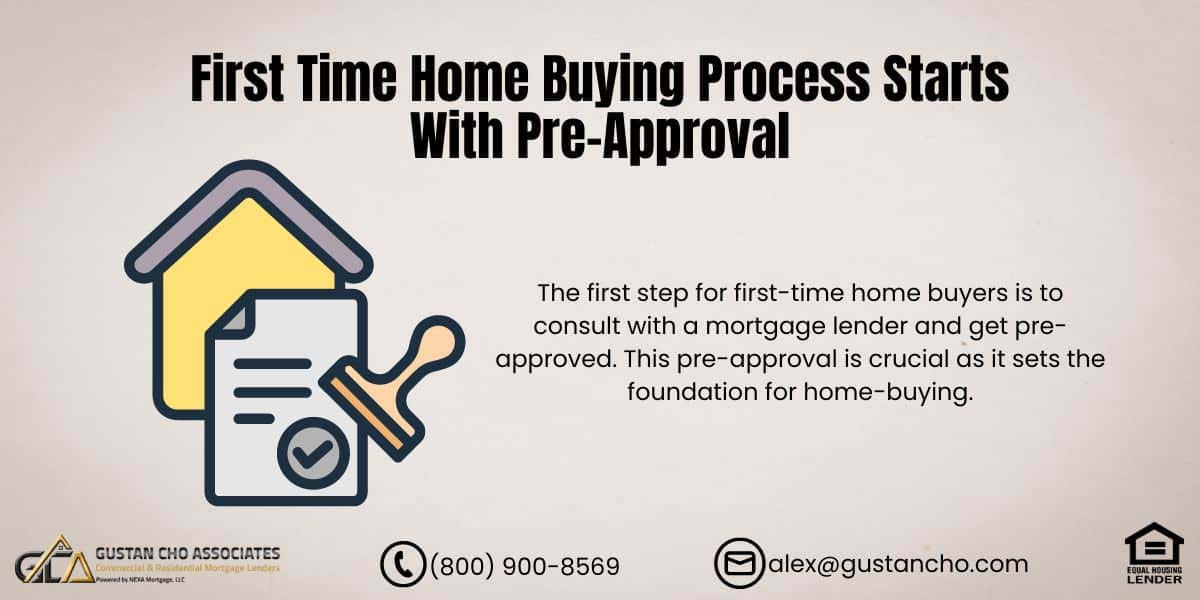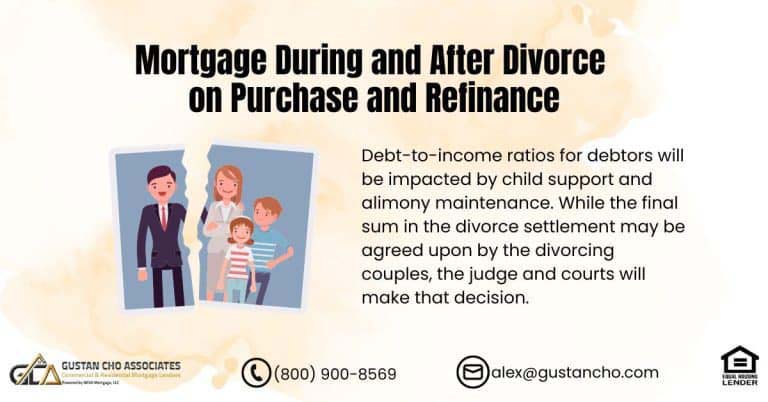This article discusses the first time home buying process, emphasizing that it starts with pre-approval.
The initial step for those currently renting or living with family and are first time home buyers is to consult with a mortgage lender. The most critical stage of the first time home buying process starts with getting pre-approved.
Over 75% of our borrowers experience significant stress during the mortgage process or face last-minute denials. This stress and last-minute denial often occur because the loan officer must properly qualify the borrowers.
The first time home buying process starts with getting pre-approved and properly qualified. There is no reason why a pre-approved borrower should not close on their home loan—not just close but close on time. Proper qualification by a loan officer to determine the mortgage loan amount a borrower qualifies for is the first step in the first time home buying process.
First Time Home Buying Process Starts With Loan Application
In the first time home buying process, the Mortgage Loan Officer will ask borrowers to complete a 1003 mortgage application. This application can be filled out over the phone or online. It is a four-page document requesting information about gross monthly income, debts, assets, and liabilities. Additionally, it includes questions about prior bankruptcy, foreclosure, judgments, tax liens, and other significant issues.
After completing the application, the loan officer will run a credit check. The completed mortgage application and credit report will then be submitted to the Automated Underwriting System (AUS). Automated approval by Fannie Mae and/or Freddie Mac’s AUS results in an approved/eligible status.
Ready to Buy Your First Home? The Process Starts with Pre-Approval!
Contact us today to start the pre-approval process and get one step closer to homeownership!
What Is A Pre-Approval
A pre-approval is granted after a loan officer reviews a borrower’s credit, income, assets, debts, credit report, credit scores, and public records and obtains approval that meets the automated findings criteria.
A pre-approval will lead to a formal mortgage loan commitment. The lender will verify all items stated on the borrower’s mortgage application.
Documents such as two years of tax returns, two years of W-2s, recent paycheck stubs, and 60 days of bank statements will be thoroughly reviewed. Lenders will also review and verify assets, debts, and liabilities and conduct a national third-party public records search.
A pre-approval letter from the lender is the ticket for the first time home buying process. It allows the borrower to start shopping for a home. There is no reason why a properly pre-approved borrower should not close on their loan.
How Long is the Pre-Approval Process?
The pre-approval process for a mortgage in 2024 typically takes anywhere from a few days to a couple of weeks. Here’s a breakdown of the steps involved and the factors that can affect the timeline:
- Application Submission: The pre-approval application can be completed and submitted online or in person. This step usually takes a few hours to a day.
- Document Collection: Gathering required documents such as proof of income, tax returns, bank statements, and identification can take a few days, depending on how quickly you can provide them.
- Lender Review: The lender will evaluate your application and documentation, authenticate your details, and assess your credit score. This procedure typically takes several days to a week.
- Pre-Approval Decision: After completing the review process, the lender will provide a pre-approval letter if you meet the requirements. Typically, this last stage takes a couple of days.
The timeframe may be impacted by variables like the completeness of your application, the efficiency of your lender, and how quickly you can provide the necessary documents. Collaborating with a proactive lender and ensuring you have well-prepared documentation can accelerate the process.
What Happens After Pre-Approval?
Upon receiving a mortgage pre-approval, you can start searching for a house with a clear understanding of your budget. Utilizing your pre-approval letter, you can submit a compelling offer on a home, proving to sellers that you are a genuine and qualified buyer.
After an offer is accepted, you will proceed with a purchase agreement outlining the sale terms. Subsequently, you will schedule a home inspection to identify potential issues, and your lender will request an appraisal to ascertain the home’s market value.
Following the inspection and appraisal, you’ll submit a formal mortgage application to your lender with any additional requested documentation. The lender’s underwriter will then review all aspects of your loan application to ensure it meets their guidelines. Upon approval, you’ll receive a closing disclosure outlining the final terms and costs of the loan.
You’ll sign the necessary paperwork at the closing meeting, pay closing costs, and officially take ownership of the home. Once the closing process is complete, you can move into your new home.
First-Time Homebuyer? The Journey Starts with Pre-Approval!
Contact us today to get started on your first-time home buying journey!
What are the Chances of Getting Denied After Pre-Approval?
While it’s generally less common, getting denied for a mortgage after pre-approval can happen if your financial situation changes significantly. Changes like unemployment, a drop in earnings, or taking on more debt could adversely affect your eligibility for the loan.
A significant drop in your credit score due to late payments or increased debt might lead the lender to reconsider your application. Maintaining stable finances and avoiding new debt during this period is crucial to maintaining your pre-approval status.
Other potential issues include the property appraisal and undisclosed information. If the property is appraised lower than the purchase price, the lender may refuse the loan or request a higher down payment. Additionally, if the lender discovers any undisclosed liabilities or inaccuracies in your application, it could result in denial.
Problems with the property, such as title issues or severe damage, can also cause a denial. To minimize these risks, ensure the property meets all lender requirements and provide accurate information on your application.
Hiring A Real Estate Agent During First Time Home Buying Process
Once armed with a lender’s pre-approval letter, borrowers can begin the first-time home-buying process by shopping for a new home. The next step is looking for a home within the pre-approval price range. Home buyers can hire a realtor immediately or start researching online, looking at available homes, and contacting listing agents.
Once you decide on a home to make a purchase offer, the next step is to place an offer. It’s generally advised to only offer the asking price if the home has multiple bidders. Start with a lower offer and expect the sellers to counteroffer.
Once the buyer and seller have agreed on the purchase price, the signed contract for the real estate purchase and any related addendum are given to the loan officer. When buyers and sellers come to a consensus on the purchase price, the finalized real estate purchase contract and any necessary addendum are forwarded to the loan officer.
At this point, the first-time home-buying and mortgage process has officially started. The loan officer will begin processing and underwriting the mortgage loan application. Realtors understand the mentality of a first-time home buyer, so feel free to ask as many questions as possible. Similarly, lenders are accustomed to working with first-time home buyers, so don’t hesitate to contact them with any questions throughout the processing and underwriting process.
Lender With No Overlays
The Team at Gustan Cho Associates are experts in helping first time home buyers and First Time Home Buying Process. Gustan Cho Associates Mortgage Group specializes in first time home buyer mortgage loan programs.
Home buyers who have had prior bankruptcies, foreclosures, open collections, tax liens, charge offs, judgments, and late payments can qualify for mortgage loans. Contact Gustan Cho Associates at www.gustancho.com. Apply online by clicking on the APPLY NOW icon to get started or call us at 1-800-900-8569 or text us for faster response. Or email us at gcho@gustancho.com. We are available 7 days a week, evenings, weekends, and holidays to answer any questions.
Related> Are You Ready To Be A Homeowner?
Related> 3% Down Payment For First Time Home Buyers
FAQs: First Time Home Buying Process Starts With Pre-Approval
- 1. What is the first step in the first-time home-buying process? The first step for first-time home buyers is to consult with a mortgage lender and get pre-approved. This pre-approval is crucial as it sets the foundation for home-buying.
- 2. Why is pre-approval important for first-time home buyers? Pre-approval is important because it helps determine the mortgage loan amount a borrower qualifies for and provides a clear budget for house hunting. It also strengthens a buyer’s offer, showing sellers they are serious and financially qualified.
- 3. How stressful is the first-time home-buying process? Over 75% of borrowers experience significant stress during the mortgage process, often due to last-minute denials. Proper qualification by a loan officer from the start can help mitigate this stress and ensure a smoother process.
- 4. What does the loan application process involve? The loan application process begins with completing a 1003 mortgage application, which includes details about income, debts, assets, and liabilities. The application and a credit check are then submitted to the Automated Underwriting System (AUS) for approval.
- 5. What is a pre-approval? A pre-approval is granted after a loan officer reviews a borrower’s financial information and verifies it meets the automated findings criteria. This includes credit, income, assets, debts, and public records. A pre-approval letter allows the borrower to start shopping for a home.
- 6. How long does the pre-approval process take? The pre-approval process typically takes a few days to a few weeks. The timeline depends on the application’s completeness, the lender’s efficiency, and how quickly the required documents are provided.
- 7. What happens after pre-approval? After receiving pre-approval, borrowers can search for homes within their budget. They can make home offers, proceed with a purchase agreement, schedule a home inspection, and appraise the property. This is followed by submitting a formal mortgage application for underwriting.
- 8. Can a mortgage be denied after pre-approval? Yes, a mortgage can be denied after pre-approval if the borrower’s financial situation significantly changes, such as job loss, increased debt, or a drop in credit score. Property appraisal issues or undisclosed liabilities can also lead to denial.
- 9. Should first-time home buyers hire a real estate agent? Yes, hiring a real estate agent can be very helpful. Agents understand the first-time home-buying process and can assist with finding homes, making offers, and navigating negotiations. They can also answer any questions you may have throughout the process.
- 9. How can Gustan Cho Associates help first-time home buyers? Gustan Cho Associates specializes in first-time home buyer mortgage loan programs and can assist buyers who have had prior financial issues such as bankruptcies, foreclosures, or late payments. They provide support throughout the home-buying process and are available to answer questions at any time. For assistance, contact them at gcho@gustancho.com or call 800-900-8569.
This blog about First Time Home Buying Process Starts With Pre-Approval was updated on June 3rd, 2024.
Ready to Become a Homeowner? The First Step Is Pre-Approval!
Contact us today to start the pre-approval process and set yourself up for success in your home buying journey.










